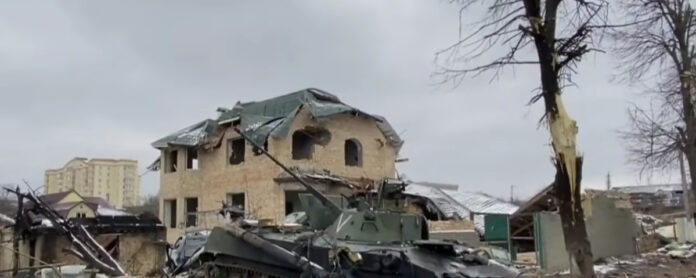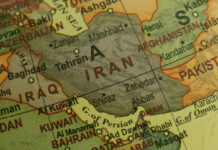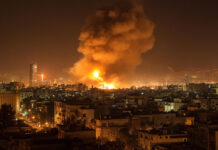Let’s assume that wiser heads prevail and Russia does not use nuclear weapons in Putin’s war in the Ukraine. That means there will be no catastrophic end-of-the-world scenario that leaves swaths of the world radioactive while we few survivors try to avoid fallout.
As happy as that should make us, it does not rule out the possibility that this invasion, the sanctions, and the destruction of the current world order will not result in a slow collapse. This war may well represent the toppling of that first domino. We may be witnessing the beginning of the end.
Let’s look at the contributing factors.
Food Shortages and Starvation
I am convinced that there will be major food shortages in much of the world. How major? Enough to lead to protests in the first world, food riots and regime change in the second world, and starvation in parts of the third world.
Food protests have already broken out, with the first one reported in Southern Iraq. That protest was driven by price increases in cooking oil and flour, which have surged because Russia’s invasion imperils the supply of sunflower seed oil and wheat. The cost of wheat has surged 70 percent in the past three weeks and countries like Lebanon are rationing wheat because they are down to less than a month’s supply.
Russia has also said it will not be exporting any wheat or fertilizer, exacerbating the problem. Even countries that can produce their own wheat, corn, and other crops will see harvests drop if farmers cannot find or afford fertilizer.
The UN’s Food and Agriculture Organization says fallout from the war will last into the 2022/2023 growing season. It expects global food prices to jump another 22 percent this year.
Countries that can produce plenty of their own grain, like the U.S., Canada, France, Poland, Brazil, Argentina, and Australia will fare the best, but will still experience food inflation and shortages of other products. As grain prices rise and the costs of transportation soars because of the rising cost of oil, we will also see the price of meat, vegetables, and other food rise.
An Energy Crisis
I am glad I do not live in Europe. Not because of the threat of war, not because of the refugees, not even because most of the countries are socialist or at least semi-socialist states. I’m glad I do not live in Europe because I expect they will see some very hard times in the next year. 2022 and 2023 will be a miserable time to live in Europe because of the energy shortage and rising energy prices. This is due largely to Europe’s reliance on gas and oil from Russia.
It won’t be a piece of cake here in the U.S., but it will be worse in Europe. Fuel costs will be higher than in the U.S. Inflation will be worse. The recession will hit them harder. Still, Europe will be better than much of the Middle East and Africa, but that’s hardly a consolation.
I think Angela Merkel’s decision to befriend Putin and make Germany so reliant on Russia oil and gas will soon be seen as one of the worst geopolitical mistakes of the 21st century. Germany is now behind the eight ball and has no terminals capable of importing liquid natural gas. Some of their industry will have to be shut down. We cannot look at Biden and his recent weakness without looking at Merkel and her lengthy policy of accommodation. She simply proved that if you keep your enemies close, you give them the opportunity to stab you in the back.
A Global Depression
Historically, war follows a depression or severe recession. In this case, I think it will cause one. The supply chain disruptions alone will cause a recession, if not a depression. The sanctions may destroy Russia and its economy, but no country will escape unscathed. Jobs will be lost across Europe as the cost of natural gas shuts down businesses that depend on it for a feedstock. (This article from Bloomberg includes some examples.) Rising grain prices, a lack of fertilizer, and rising transportation costs will also hurt farmers.
When people are forced to spend more money on gasoline, home heating, and food, they will have little left to spend on dining out, taking vacations, and non-essential goods like furniture and consumer electronics. This will ripple through the economy, costing jobs and causing businesses to close or go bankrupt. Losing jobs will mean less money in people’s pockets, which will drive down consumer spending even more.
The same interconnectivity of the world that hurt us during the pandemic will be even worse now. That many companies are pulling out of Russia or have refused to do business with them (including three large shipping companies) demonstrates how severe the disruption will be. Russia may well sit there with grain in silos, metals in warehouses, and fertilizer in rail cars and no one willing to buy it or transport it. Russian oil is already selling and a $25 discount because no one wants to buy it.
Again, I think the economic damage will be worse in Europe than in the U.S. because Europe is more dependent on more goods from Russia. China will probably come through a recession without too much damage, in part because it has built up a large supply of food and other commodities.
Global Trade is Failing
The world was once divided into two camps. We called these the Free World and the Warsaw Pact. There was trade within each camp, but little between them. After the collapse of the Soviet Union and the end of the Cold War, one of the supposed “peace dividends” was global free trade. The benefits of global trade have always been questionable, but free trade is soon going to be a thing of the past. Even if the war ended tomorrow, Russia would remain a pariah, sanctions would continue, and anyone who traded with them would fear contamination.
Chin, Belarus and Kazakhstan would probably continue to trade with Russia, forming a new trading bloc. Parts of Africa that are indebted to China because of their belt and road initiative might join in, but there would be a great choosing of sides as the world splits back into two camps.
Over time, we would see more manufacturing return to North America as companies who have been burned twice in the past three years look to secure local supply. We may also see them increase inventories of raw and finished goods to better manage future supply chain hiccups. This could help lift us out of the recession, but it will take years.
It’s the Economy, Stupid
I think the danger to the economy of Europe, the U.S. and the world is our biggest single challenge. Our high debt loads could be the straw that breaks the camel’s back and rates rise and a recession sets in. Inflation could give way to hyperinflation, with the only question being, what monetary unit will survive?
One could look at a recession as a reset, an opportunity to get rid of weak companies and a chance for companies and countries with large debt loads to default. We would then have to hope that the United States rises from the ashes like Phoenix.
Is that possible? Not under Joe Biden. I would go as far as to say, not under any politician I can think of. But maybe someone will rise to the occasion. Rebuilding a ruined economy and leading the world out of a collapse will be no easy task.
European Preppers
When I look at my web traffic statistics, the UK, Germany, and Spain are the third, fifth, and ninth countries on my top 10 list (behind the U.S. and Canada). I am glad there are preppers in Europe. If you are reading this from that side of the Atlantic, I urge you to buy food and store it in your home. Buy canned goods, dried foods, and cooking oil. Take some money from your bank accounts and use it to fill your cupboards. Hide food under your bed. Tuck some tins away in the closet. Put some meat in the freezer. Review our article on how to prepare for the coming wheat shortage. If you live somewhere you can raise a garden or have chickens, do so this spring, while you still have time. You will need every calorie of food in the coming years.
I also encourage those of you in northern climes to buy wool sweaters, socks, and thermals. Unless you are wealthy, you will be cold this coming winter. Get warm clothing and a heavy duvet cover. Our bedroom can get down to about 14 or 15 degrees C and our bath to 11. I know you can stay warm on the coldest night if you have with proper bedclothes.
Buy an electric blanket and use it to pre-heat the bed and then turn it off before you climb in. If your home has a fireplace, get the chimney inspected for safety and buy or cut some firewood. Or salvage newspaper and corrugated cardboard and make your own compressed logs. There will be so little natural gas available and prices will be so high that you will treasure every BTU the fireplace produces this coming winter.
We are in for a Tough Couple of Years
I’ve been a prepper for more than 25 years, and I cannot recall a time when the possibility of needing our preps was closer that it is today.
Wherever you live, we are in for a tough couple of years. This could be the beginning of the end. It could lead to an economic collapse, which could lead to a social collapse. Our job as preppers is to survive and then rebuild our lives afterwards. That includes protecting and feeding our loved ones, sheltering them from the worst of what may lie ahead, and to returning to stability and plenty as soon as possible. To do this, you will need to be prepared, resilient, creative, and lucky.








It’s THAT time. People need to wake up to the seriousness. This isn’t the 70s, it’ll be worse than the 30s….. and who says that we come out of this a superpower?? Our enemies want to send us back a millennia
Comments are closed.